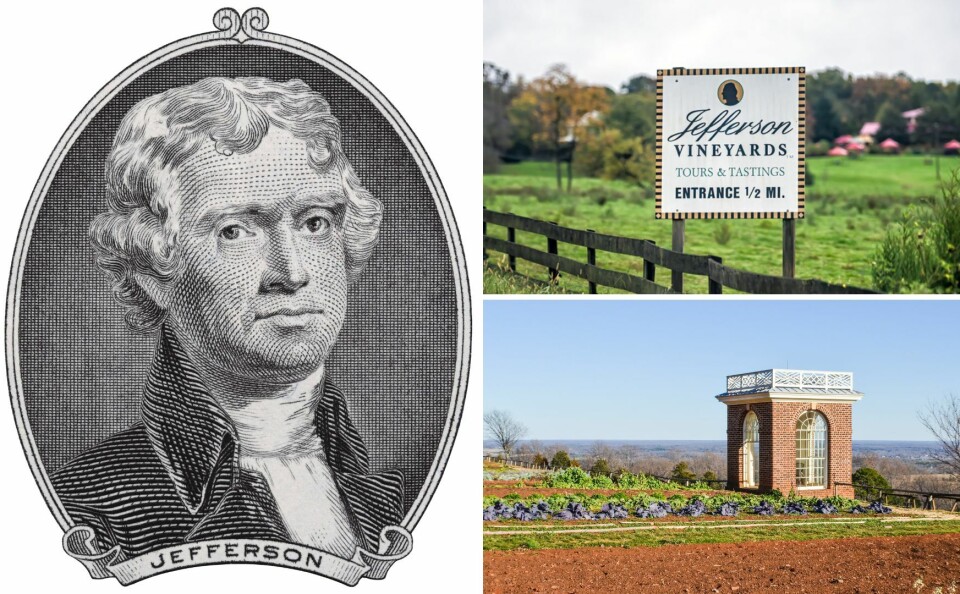-
Is new healthcare fee for Americans still on the way in France?
Last year French MP told how he put forward plan aimed at ‘visitor visa’ holders
-
France to host first NFL regular-season game at Stade de France in 2026
The US’s National American Football League has over 14 million fans in France
-
Euro reaches strongest exchange rate against the US dollar in five years
Strong euro spurs economic debate within the eurozone and in France
US president Thomas Jefferson’s French wine tour has lasting legacy
The third President of the United States wanted an American wine industry to compete with the ‘debauchery’ of whisky

American president Thomas Jefferson’s wine tour of France in 1787 left a lasting impact on France’s wine sector and participated in fuelling one of France’s most controversial epidemiological studies.
Mr Jefferson – then a representative of Virginia – travelled around most of France, visiting Strasbourg, Nancy, Lyon, Nice, Aix-en-Provence, Toulouse, Bordeaux, Nantes, Rennes and Paris.
For one, many of the wines from Bordeaux he brought back to the United States were designated ‘grand cru’ by Napoleon III in the classification of 1855, a testimony to his savviness in wine-tasting.
Read more: Five tips for drinking better wine in France without spending more
‘No nation is drunken where wine is cheap’
The owner of a plantation in Monticello (VA) with two vineyards, wine enthusiast Jefferson toured France on the advice of his doctor in order to heal a broken wrist, but ended up on the road tasting many of France’s wine and champagne specialties.
However, the trip also had commercial implications since the future third president looked to bring a similar wine industry to the United States to compete with rum and whisky, alcoholic drinks he despised and thought responsible for debauchery.
“No nation is drunken where wine is cheap, and none sober, where the dearness of wine substitutes ardent spirits as the common beverage. It is, in truth, the only antidote to the bane of whiskey,” he said in his notes, as reported in Thomas Jefferson On Wine by American journalist John Hailman.
Read more: Most French people are open to under-18s trying alcohol, study finds
Embarking on his buckboard (horse-drawn carriage) on February 28, Mr Jefferson stopped off in the Burgundy and Beaujolais regions to sip pinot noirs; he guzzled Hermitage and white Châteauneuf-du-Pape in Lyon; and sampled Bellet in Nice before falling for Château d’Yquem, arguably one of the best wines of the world, when he stayed in Bordeaux for four days.
The trip ended in Nantes, Angers, Tours, Orléans and Epernay where he quaffed white wines before a return to Paris on June 10.
Noticed the ‘French Paradox’ of diet and health
Mr Jefferson participated in introducing wine more widely on American tables over his two terms (1801-1809), his personal notes and accounts having recorded the buying of 20,000 bottles.
Moreover, his travel notes in France were some of the first to notice what Americans will later call ‘the French Paradox’, an expression to define their perplexity at French people’s dietary standards while seemingly not bearing any negative health consequences.
“Mr Jefferson’s happiness ideal is not dissociated from the art of living happily,” said Daniel Royot, emeritus teacher of literature and American civilization at Sorbonne University.
“Wine could only be part of the French Paradox’s pursuit of happiness,” he added.
In return, several winegrowers paid tribute to the American, naming some of their products after Mr Jefferson such as Frontignan Muscat, which marketed a muscat ‘cuvée du président Thomas Jefferson’; and Les Vignerons du Chevalier Georges which released a red and a white viognier wine.
Related articles
Two Americans moved to France 50 years apart - what has changed?
Julia Child’s French home remains a cookery school - with no recipes
‘British drinking habits come as a shock now we live in France’
























